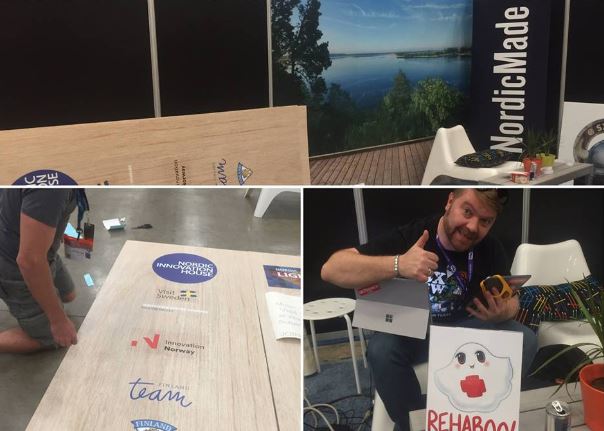Finland: the Nordic ed-tech trailblazer?

Yes, this title is intentionally a bit “provocative”—especially for my friends in Norway, Sweden and Denmark—as there have been a number of interesting edtech developments in each of these countries, especially in the last year or two.
But at least based on my own experience, and what I know right now, I still think that Finland might rightfully claim to have been, and still be, the Nordic edtech trailblazer. Below, I will include at least some of the reasons for why our Finnish friends could make this claim, but first I have to make a “full disclosure” and admit that even though I am of Norwegian descent (left Norway for Silicon Valley when I was 18), most of my edtech work (outside of Silicon Valley) has been in Finland, so this is the Nordic country I know best when it comes to edtech.
I expect, and hope, that my friends and others in Norway, Sweden and Denmark (and perhaps even Iceland) will argue their case for why they perhaps are catching up with the Finns, perhaps especially when it comes to having edtech companies that are growing rapidly in domestic, regional or global markets.
So what are the “facts” about the edtech scene in Finland that seem to put it ahead of the pack in the Nordic region? Here are a few of the most interesting developments in recent years that have contributed to Finland’s edtech prowess—at least in terms of having a vibrant edtech ecosystem:
The role of Tekes in supporting edtech ecosystem
Tekes—the Finnish Funding Agency for Innovation—has long played an important role in Finnish edtech by providing more funding for edtech-focused companies and other organizations than any other Nordic agency, as far as I know. One particularly interesting, and large, program that illustrates this kind of support was the Learning Solutions Program, in which Tekes provided € 30 million over a four year period (2011-2015) to a range of education and learning projects—most of which, I think, would fall under the umbrella of “edtech, Total funding under the program was actually € 52 million, when including co-funding by the participating organizations.
To follow up on this and other related Tekes programs, and to examine some of the impacts of edtech programs in Finland, Tekes commissioned a study/survey in 2015 (described in this article The future of Finland’s education exports lies insmall enterprises and large ideas), published in June, 2015]. The study concluded that Finnish edtech exports were surprisingly (at least to me) high, amounting to € 269 million in 2014, and the survey also found that “… education export start-ups [in Finland] will need € 26 million in capital investments in the next two years.” Some of my Finnish friends in Silicon Valley have noted, however, that despite the export success that Finnish edtech companies may have had, they have so far seen very few, if any, Finnish edtech companies, making much of a splash in the US market.
Tekes connecting Finnish edtech to Silicon Valley
In March, 2014, Tekes organized a very impressive workshop in Silicon Valley–Games for Learning: Transforming Learning and Assessment with Digital Games–connecting a variety of Finnish organizations and edtech individuals to the Silicon Valley edtech ecosystem, especially around game-based learning issues and developments. The event was done in collaboration with Electronic Arts and Glasslab, both major game-focused players in Silicon Valley.
While it is of course difficult to connect this and other Tekes-sponsored activities to the activities of Finnish edtech companies, and their potential future growth, it is interesting to see that Rovio (which was represented by, among others, Peter Westerbacka, at the Silicon Valley workshop in March 2014, recently spun out its learning operations into a separate company, Academy for Fun (under the leadership of Sanna Lukander, formerly Rovio’s VP of Education).
Strong academic edtech programs
Although I have long known about some of the Finnish academic programs in edtech– including what Jari Multisilta and his colleagues have been doing for years at Univesity of Helsinki, and what Jarmo Viteli and his colleagues at University of Tampere have been doing around ectech and teacher education, for instance—I didn’t not know, until very recently, about the very interesting and impressive program that Blair Stevenson and his colleagues at Oulu University of Applied Sciences are running. Here is how Blair described their operation in an e-mail to me in November, 2015:
“Overall, we have a rapidly expanding pre-incubator program at the Oulu University of Applied Sciences called Oamk LABs (oamk.fi/labs). Growing from our original LAB – Oulu Game LAB – which focuses on the creation of multidisciplinary teams to build prototypes, products and then start-ups targeting the global games industry, we have now included two more LABs: one that focuses on industries such as health technology and energy / environment (DevLAB) and then another that focuses on the global education technology industry (EduLAB). All these LABs are taught in English and are full-time, 5 month educational programs.
The ultimate goal is to create new start-ups that have a beta product and want to find seed funding and further clients, and expand to become a viable business. Usually after 10 months in our program (two successive LABs), new start-ups have been formed and are often ready to join accelerator programs.”
xEDUco edtech accelerator in Helsinki
Early last week I sent out a note to all my friends at the Nordic Bridge Organizations in Silicon Valley—i.e. including Innovation Norway, Nordic Innovation House, Vinnova, Innovation Center Denmark, Tekes, Finpro, and Team Finland—to alert them about our new Nordic EdTech Network project, and asking them to alert me when they heard of any Nordic visitors with edtech interests coming to Silicon Valley. The next day, I received a note from Team Finland about Antti Korhonen’s visit, and was told he is the CEO of a new edtech accelerator—xEDU–in Helsinki.
I was very pleased to meet him last week, and to hear about this new development on the Finnish edtech scene, as I have long felt—and talked to many about—the need for edtech focused accelerators in one of more Nordic countries (and we have a number of them here in Silicon Valley). As you can see from the excellent website of xEDU, they already have an impressive number of companies and organizations, as well as edtech experts, participating in their community. Within a week or so, they expect to announce the dozen or so companies that will be part of the first cohort of their accelerator. Finally, the accelerator has an impressive list of partners, as well as its “incubator partner” of Oulu University of Applied Sciences (mentioned above in my discussion of what Blair Stevenson and his colleagues are doing).
We hope to soon have guest postings on our blog from Sweden and Norway, so in the next week or two, you will hopefully learn more about what is going on in these countries, and we will also hopefully have another guest post by Blair Stevenson, so we can learn more about the programs and activities in Oulu, and learn a bit more about what form the collaboration may take between Oulu University of Applied Sciences and xEDU. So, stay tuned. The Nordic edtech scene is evolving and the ecosystem is growing bigger and more vibrant. Please let us know, either by commenting on this post, or go to the Discussion Forum and contribute your thoughts, comments and observations.
This article was originally posted on the Future Learning Lab.




